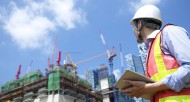On today’s episode, we will hear from a surveying service provider from Slovenia who proudly claims, “Geodesy is life!” This passionate surveyor’s name is Bostjan Hrovat, and in this episode we will learn about some of the most memorable surveying jobs he’s had the pleasure of doing in his career, the equipment that drives his business forward, and his philosophy on what it takes to be a good surveyor.
1:20 – How surveyor Boštjan Hrovat got into surveying and what surveying services his company Geo-etika is providing.
2:33 – What are must-have traits for a surveyor?
4:12 – Surveyor Boštjan Hrovat’s first piece of surveying equipment.
5:16 – What is the equipment you mostly work with today?
5:21 – When did surveyor Boštjan Hrovat decide to upgrade from your system 1200 manual total station with GNSS to the TS13 robotic total station and GS18 I RTK rover and why?
5:45 – How has the workflow changed working with the TS13 robotic total station and GS18 I RTK rover?
6.30 – Is there a service surveyor Boštjan Hrovat is able to provide thanks to the new equipment that you were not able to provide before, or are you able to conduct it a lot more efficiently, safely or accurately?
8:02 – How long did it take to get a return on investment on your TS13 and GS18 I?
8:21 – Has the surveying work become more enjoyable with the new equipment?
9:23 – Projects Boštjan Hrovat has worked on that many might be surprised to learn require the skills of a surveyor.
11:04 – Most memorable and unusual surveying project of surveyor Boštjan Hrovat.
12:30 – Are there enough surveyors in Slovenia? Boštjan Hrovat’s hopes for his children to step into surveying.
13:48 – Surveyor Boštjan Hrovat’s prediction on the future of surveying? How will the role of the surveyor change in the future?
15:29 – What technological advances surveyor Boštjan Hrovat would like to see in the future.
16:20 – Why should someone get into surveying?
NC: Hello and welcome to HxGN Radio. My name is Nathanya, and I’m thrilled to welcome you to another episode of Tales of the Surveyor, a podcast that brings stories of surveyors into the spotlight, from feats in the field to behind the scenes technology development and much more.
On today’s episode, I have the honour of interviewing a surveying service provider from Slovenia, who proudly claims, “geodesy is his life.” This passionate surveyor’s name is Bostjan Hrovat. And in this episode, we will learn about some of the most memorable surveying jobs [that]he’s had the pleasure of doing in his career, the equipment that drives his business forward, and his philosophy on what it takes to be a good surveyor. So, let’s jump into the interview.
Bostjan, welcome to HxGN Radio. Thank you so much for joining us today.
BH: Yeah. Hello and I’m pleasure to [be invited].
NC: Yeah. Thank you, Bostjan. You are a passionate surveyor. That’s what you told me. You’ve been surveying for 17 years now and you have a company, Geo-Etika. So, I would love to hear from you, Bostjan. How did you get into surveying? And also, tell us a bit more about your company. What are the services that you’re providing?
BH: Okay. Well, when I was a child, I already knew that I wanted to do a dynamic work, work with people and if possible, in the nature. So, I started in the secondary school of land surveying, surveyed, and then faculty in civil and geodetic engineering at Ljubljana, where I graduated in 2006 and became our engineer of geodesy. Shortly after, after my first job, I decided to start with my own company, Geo-Etika.
In my company I provided service in the field of cadastral, the topographic measurement, and generic.
NC: Very nice. So, you already knew from a child that you wanted to do something, yeah, as I said, dynamic. Would you say you love nature? Do you like to be in nature?
BH: Yes, of course. All the time.
NC: Of course, yeah. You have to be, as a surveyor, right? You have to love it.
You said of yourself—so when we talked first, you said of yourself that you’re a perfectionist and others even describe you as ultra-precise. Do you think those are must have traits for a surveyor?
BH: No. In my opinion, being a perfectionist then too ultra-precise in these days, it’s a duty that can limit you. Well, in my opinion, it’s more important for a surveyor to be responsible, patient, and to be systematic in building a knowledge base.
NC: So, would you say that you are like constantly learning and trying to advance yourself in order to be the best surveyor possible?
BH: Yes. That’s what I mean. Yeah.
NC: Absolutely. And if you talk about systematic, so being systematic as a surveyor, can you maybe elaborate more in-depth? What do you mean by being systematic when you’re surveying?
BH: To go step by step. When you learn something new, you must write in the head, and when you need something similar, then you go back and use what you learnt before. And that is the most important [thing]in the surveying work.
NC: Mm-hmm. So, it’s really about learning new skills and realising maybe have a new realisation and then making sure that as you go to the next project, you applied there as well and you grow as you move.
BH: Yeah. With growing curves, of course.
NC: Oh, absolutely.
So, you of course use technology also to be a, like to advance, to advance like in a systematic way. And I’d love to hear from you, what was your very first equipment, very first surveying equipment, that you owned?
BH: The first product of surveying equipment was SmartStation, a manual task station with GNSA contained on the top. And to use this for quite a long time.
NC: Nice. Nice. So, was that like—or like, what was the main activities? What were the domain services you provided with that type of equipment?
BH: The job for in cadastre and topographic measurements.
NC: Were there any other pieces of equipment you have owned over the time?
BH: No, just this.
NC: This one has been very faithful to you, then. But today, you no longer use the SmartStation. You have other equipment. So, tell us a bit more about the equipment you’re using today.
BH: Today I mostly work with, uh, [Leica] TS13, a robotic total station and GS18 RTK Rover.
NC: What about you know the manual Total Station before you were working with a manual total station, the TS13 is a robotic total station. What are the differences in your workflow since you’ve changed from manual to robotic total station?
BH: Workflow has changed dramatically with the use of these devices. The speed and quality of the [measurement]has increased significantly. All the field work I can do by myself. The most important thing is that the collected data is complete. And there are no data issues, which were quite frequent in the previous classic way of work.
NC: Wow. Yeah, that is a big change. It’s nice to hear that you were able to make this big step, this big move forward. Are you able to provide new services now that you have the new equipment, or is maybe your services that you’re providing more safe, accurate, or efficient? I mean, you already talked a bit about it now, but yeah, tell us a bit more about the positive consequences of making this investment.
BH: Thanks. [With] the new equipment, I’m much more efficient in doing all of the measurement, thanks to the dual compensation and the possibility of determining the coordinates from the images of the GS18 RTK rover. I can do work much faster, as well. I can determine the coordinates of previously inaccessible points.
In the case of road measurement, I do my work even more safely. With the new equipment, the accuracy of the captured data has increased as the operation, operator, is located in the entry point on data capture.
NC: Ooh, yeah. Well, I’m happy to hear that you’re safer. Surveying can be quite a dangerous trade, a dangerous job to do. For all our listeners, absolutely listen to our previous episodes where another surveyor talked about the danger in surveying. So, Bostjan, I’m happy to hear that you are safe.
And Bostjan, we all know that new equipment means investment. So, do you know how long did it take you, more or less, to get your return on investment for the TS13 and the GS18?
BH: Yes. The investment is going to return in two years.
NC: That’s nice to hear. And would you also say besides the efficiency, the accuracy, the return on investment, is work nicer for you? Are you more like enjoying your work more as you’re out in the field?
BH: It’s a pleasure to work with these devices.
NC: I’m happy to hear that. What is making your work nicer? What is making your work more pleasant as you’re working with the new equipment?
BH: To be faster, to do [it]alone, to do without other people put on of time. Sometimes I work when I want to work, and that’s the advantage for me.
NC: Well, Bostjan, you told me that geodesy is your life. Surveyors are just such passionate people, and you definitely are a passionate surveyor. But the sad thing is actually that a lot of people don’t even know surveying that well. Can you tell me, what project have you worked on that people might be surprised required the skills of a surveyor?
BH: I measure the bell and ease of the floor of the world. Learning to shut down in the paper mill establishment of geodetic control network for the needs of carry out the measurement during the archeological work. Every time I go on the street, somebody come over to me and ask, okay, Bostjan, I need something to measure. And I go.
NC: Uh-huh. So, you go wherever you’re needed, basically.
BH: Of course. Every day if I go on street.
NC: Oh really. Every day if you walk around, people come up to you and tell like Bostjan, we need you. We need a surveyor.
BH: We need—and one or two time a day, this is happening.
NC: Wow. Well, you are really a sought after surveyor. I’m happy to hear that.
I’m curious, can you tell us a bit more about applications you were just describing? So, the first one was in a paper company, or can you describe this a bit more?
BH: When they stop the machine, the roller are not parallel, and then approximately they set and then geodata surveyor and said what side of the roller in the right position.
NC: So basically, you had to align the roller so that the paper was created in a correct manner. Do you have other stories, other applications or memorable projects that you were a part of as a surveyor?
BH: My most unusual funny project was that I precisely measured a 1,000 metre roads for an old man, passionate cyclist. See, the section of the road was not completely flat. I had to mark a line for him along the road, along which he drives to cover exactly 1,000 metre. The man hired me to measure a road because it bothered him, the different type of bicycle computer, gave him different, gave him different results. The measured distance curve he to set up all his computer cycling computer.
NC: Okay, got it. So, the man really wanted to know what is the distance that he was driving and he needed your surveyor skills to adjust to his bicycling computers. This is a very funny application for a surveyor.
See, we need surveyors everywhere in life. And I’m happy, Bostjan, that you are a part of your community and you’re giving your surveying services to, yeah, to all these people. But I mean, sadly, in a lot of places, we are lacking surveyors. How is it in Slovenia? Do you have enough surveyors?
BH: According to my opinion, currently we have a shortage of surveyor[s]in Slovenia. Some of student finished the study. Even they are not interested in this area. Therefore, they find the job opportunities in the other segment. But those who started in surveying companies, it takes time to became independent worker. The experienced surveyor are not very interested in the field of cadastre because this field is full of bureaucracy.
NC: And you are doing cadastre and you also are a father of two. Do you think that your children are going to follow your footsteps?
BH: Maybe. But my two kids are young and still exploring their talents. I will definitely not push them to follow my stead. They must explore their talents.
NC: Well, let’s see what their future brings.
I’m also interested to hear from you, Bostjan. What do you think that the future of surveying is going to bring, because we have this shortage of surveyors? We have new technology. We have to survey an industry evolving. So, what is your prediction? Where is the surveying industry heading?
BH: The future of surveying is in the automation and robotics, that’s easy. The surveyor will be less and less occupied with the fieldwork due to the state of the machinery and equipment. The brain role of the surveyor will be definitely [changing]in the upcoming years. The statistics service that are regulated by the law will be further provided by surveyors. Other services will be covered by [the]younger generation of all professions. Younger generation understand technology better than majority of surveyors.
NC: So, the surveyors basically going to be more the data specialists, the person who is really using the data, understanding the data and applying the data that is being generated by the technology, right? And as you very rightly said, there is still some very important applications for even by law, you need a surveyor, you need the precise eye and the skills of the surveyor himself. And there, of course, we are probably never going to miss a surveyor, even if the future changes.
BH: Yes.
NC: So yeah, you already said it. The technology will adapt. It’s going to be even more advanced. There’s going to be more automation and the technology will have to adapt to future environment, to changes, but hopefully also drive change. So, I would love to hear from you. What technological advances do you see in the future? What would you like to see in the future in terms of surveying technology development?
BH: I would be very fascinated, the similar device to our rover will be development in the future, which should be used also in the forest where it’s now set a low ability. And it could enable determine the coordinate the national coordinate system in real time with one or two-centimetre accuracy. This would eliminate time consuming classical measurement.
NC: Yeah, I mean, I guess we all, every surveyor dream of the rover does need a satellite actually to give us the position, right? Or that gets the signal somewhere through the wall.
BH: Yeah.
NC: Well, closing one last question for you. Bostjan, if someone is thinking about becoming a surveyor, what would you say? Why should she or he become a surveyor? What is it that makes you so passionate about surveying in geodesy?
BH: If you are the people who love the nature, knows the modern equipment and the progress, join the surveyor.
NC: Yes. Bostjan, beautiful, perfect words to close our podcast portion.
Thank you very much for sharing your passion for surveying with us, to give us the insight into your life as surveyor. And I wish you all the best on your journey and a lot of happy surveys.
BH: Okay. Thank you for inviting me.
NC: We appreciate your time today. Again, thank you for joining us. To our listeners, you can learn more and tune into more HxGN Radio episodes on iTunes, Spotify, or SoundCloud, or visit hxgnspotlight.com for more stories from Hexagon.
Thank you for listening, and hopefully see you soon.
















